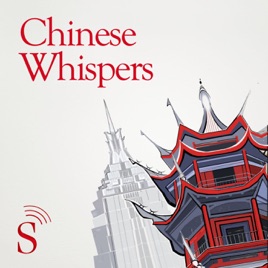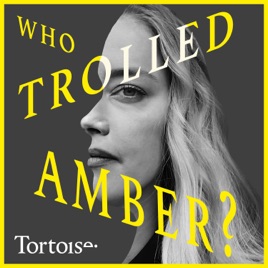
Advertise on podcast: Chinese Whispers
Rating
4.5 from
Country
This podcast has
91 episodes
Language
Publisher
Explicit
No
Date created
2020/07/07
Average duration
44 min.
Release period
16 days
Description
A fortnightly podcast from the Spectator on the latest in Chinese politics, society, and more. From Huawei to Hong Kong, Cindy Yu talks to experts, journalists, and long time China-watchers on what you need to know about China.
Podcast episodes
Check latest episodes from Chinese Whispers podcast
What the Messi row reveals about Chinese football
2024/02/19
The Argentinian football star Lionel Messi has been trending on Weibo – and unfortunately, not for a good reason. It all started when Messi sat out a match in Hong Kong earlier this month. His reason – that he was injured – wasn’t good enough for some fans, and keyboard nationalists quickly took offence when Messi played in Japan, a few days later. The furore has dominated Chinese social media over the last few weeks, and even led to the cancellation of some upcoming Chinese matches with the Argentinian national team, as authorities demanded an apology from Messi.
What a mess. But beyond its seeming triviality, this episode tells us something about the nature of Chinese online nationalism, I think, and it might also shed light on how football works within China. After all, why is it that China, which is so good at so many things, has still failed to turn out a competitive national team? That is the multi-billion yuan question that puzzles football fans within and outside of China.
Joining me on the episode this week is Cameron Wilson, an expert on Chinese football and founder of the Wild East Football blog, who has lived in China for almost two decades.
Produced by Cindy Yu and Max Mitchell.
more
Why do people join the CCP?
2024/02/05
At last count, the Chinese Communist Party has 98 million members, more people than the population of Germany. Its membership also continues to grow, making it one of the most successful and resilient political parties of the last a hundred years, perhaps with the exception of India’s BJP, which boasts 180 million members.
And yet the CCP's track record is strewn with bloody crackdowns and systematic persecution. So what would drive someone to join the CCP, and what accounts for its success? Do party members today all support the atrocities committed by their government? I think these are important questions to ask, because without understanding the answers to them, one couldn’t understand China’s modern history or its society today.
To delve into the psychology of card carrying communists, I’m joined by two great guests in this week's episode.
Xinran Xue is a Chinese journalist, who had a popular radio show in China in the 90s, before moving to the UK and becoming an author of numerous books on China. Her latest book is called The Book of Secrets, which is a memoir of sorts, where her protagonist was one of the founding members of the CCP’s intelligence service. I recently reviewed it for The Spectator.
Professor Kerry Brown is Director of the Lau China Institute at Kings College London and a former diplomat in Beijing where he worked alongside Chinese government officials for many years. His latest book is China Incorporated: The Politics of a World Where China is Number One.
On the episode, we discuss the party membership's divide between the intellectuals and the peasants; how the Cultural Revolution changed the party from an ideological body to a corporate one; and what a new generation of communists might have in store.
more
Was China's economic boom 'made in America'?
2024/01/22
Today, the US and China are at loggerheads. There’s renewed talk of a Cold War as Washington finds various ways to cut China out of key supply chains and to block China’s economic development in areas like semiconductors and renewables.
There’s trade, of course, but the imbalance in that (some $370 billion in 2022) tilts in China’s favour and only serves as another source of ammunition for America’s Sinosceptics. China, on the other hand, is also decoupling in its own way, moving fast to cut its reliance on imported technology and energy.
At this moment, it seems like US-China tensions are inevitable – but look into the not so ancient history, and you’ll find a totally different picture. In fact, when it comes to Communist China’s early entry into the global economy, American policymakers and businesspeople were vital in the 1970s and 80s. You could even say that a big part of China’s economic success was ‘Made in America’.
I'm joined on the podcast by Elizabeth Ingleson, Assistant Professor of International History at the LSE, whose upcoming book contains some very interesting research on this question. It’s called Made in China: When US-China Interests Converged to Transform Global Trade. We discuss President Nixon's visit to China and how that opened up decades of American economic support to the Chinese miracle – including at the expense of its own workers.
more
What lies at the root of the India-China rivalry?
2024/01/08
India is the fifth largest economy in the world, and now has a population larger than China’s. It’s no surprise, then, that officials in Washington often see India as a powerful non-western bulwark to growing Chinese power. On this podcast, I look at where China and India’s rivalry comes from. How much have long-lasting skirmishes on the China-Indian border damaged relations? How have demographics, economic competition and recent international conflicts affected the relationship between the two countries? And are the domestic politics of China and India in fact more similar than most westerners like to admit?
I speak to Avinash Paliwal, an international relations expert at the School of Oriental and African Studies, and the author of India’s Near East: A New History.
more
Who will be Taiwan's next President?
2023/12/11
Taiwan goes to the polls in just over a month. This is an election that could have wide repercussions, given the island’s status as a potential flashpoint in the coming years.
The incumbent President, Tsai Ing-wen, is coming to the end of two elected terms, meaning that she cannot run again. Her party’s chosen successor is William Lai – Lai Ching-te – who is the current vice president. For most of this year, he has been facing off opposition from the Kuomintang, the biggest opposition party in Taiwan, and the Taiwan People’s Party, a third party led by the charismatic Ko Wen-je.
Lai remains in the lead with a month to go, but polls show that the KMT is only a few points behind, meaning that an upset is still possible. Since Taiwan became a democracy, it’s the KMT that has been the party calling for closer relations to China, and Tsai and Lai’s DPP that has been more pro-independence and pro-West. Given Beijing has shut off the hotline with Taipei in protest of the DPP since Tsai was first elected in 2016, if Lai wins in January, relations with Beijing are unlikely to get better. But how can the KMT justify closer relations with China, when it seems like the world is in a different place compared to 2015, the last time the KMT held the presidency?
Joining the episode is William Yang, a Taipei-based freelance correspondent, who has written for Voice of America, Deutsche Welle, the Guardian and the Times.
more
Dialect and identity: is Mandarin bad for China?
2023/11/28
Across the span of China, a country as big as Europe, there are countless regional dialects and accents – perhaps even languages. Often, they're mutually unintelligible.
The Chinese call these ‘fangyan’, and each Chinese person will likely be able to speak at least one fangyan, while also understanding Standard Mandarin, the official language of the People's Republic. It means that the Chinese are more multilingual than you might think.
But it also means that the question of language is inherently a political one. Standard Mandarin has a relatively short history, created by the country’s founding fathers to unify the spoken word in a huge country. But with the ubiquity of Standard Mandarin now, is fangyan at risk of dying out?
Joining the episode is Gina Tam, a historian and author of Dialect and Nationalism in China.
more
Battling the official narrative – China's 'underground historians'
2023/11/13
Controlling history is key to the Chinese Communist Party’s control of the country. Whether it’s playing up the ‘century of humiliation’, or whitewashing past mistakes like the Great Leap Forward or the Tiananmen Protests, the Party expends huge effort and resources on controlling the narrative.
That’s why it’s so important and interesting to look at those Chinese people who are documenting the bits of history that the Party doesn’t want you to know about. They interview survivors from Communist labour camps, or keep their own memoirs of the Cultural Revolution, and try to keep the memory of past horrors alive through film, magazines and paintings.
A new book called Sparks documents their work. Its author is Ian Johnson, a Pulitzer-Prize winning writer and long time China journalist. Ian calls these people the ‘underground historians’. He joins this episode of Chinese Whispers.
Visit https://minjian-danganguan.org/ to see some of their work documented, in an upcoming website founded by Ian and others.
Produced by Cindy Yu and Patrick Gibbons.
more
Rethinking Chinese food with Fuchsia Dunlop
2023/10/30
All cultures care about their cuisine, but the Chinese must have one of the most food-obsessed cultures in the world. It may be because we have the best food...
Those listeners of Chinese Whispers who’ve been to China will know exactly what I’m talking about. For those of you who haven’t, you may have come across the classic Chinese takeaway with dishes like sweet and sour pork, or you may like Cantonese dim sum, and some of you may be big fans of Sichuanese cooking.
But China has so much more to offer than what has made across into the West’s Chinese restaurants. Thankfully, that’s changing and quite fast.
Part of the education campaign to bring more of the diversity and richness of Chinese cuisine to the West is the work of people like Fuchsia Dunlop. She trained to cook in Chengdu and is one of the most engaging and thoughtful writers on Chinese cuisine in the English language.
I’m delighted to be joined by her on the podcast today, to mark the publication of her new book, Invitation to a Banquet, which is all about the history, meaning and diversity of Chinese cuisine.
more
'The mask has slipped' – Tuvia Gering on China, Israel and Hamas
2023/10/16
When China brokered a historic detente between Saudi Arabia and Iran earlier this year, it seemed that a new phase in world history – and certainly in Chinese foreign policy – had opened up. Instead of the US being a policeman of the world, it was the rising power, China, that was stepping into that role. Whereas Chinese foreign policy had previously only really cared about promoting trade and silencing dissidents, it seemed that perhaps, now, Beijing was taking a more leadership role in global diplomacy and security issues.
And yet the events of the last week and China’s response to them have shown that perhaps the country isn’t ready for that responsibility just yet. In response to the horrors unfolding in Israel and later Gaza, Beijing has given only lukewarm statements, calling for 'relevant parties to remain calm, exercise restraint and immediately end the hostilities to protect civilians'. At no point has it condemned Hamas by name.
So what does this mean for China’s grander ambitions in the Middle East? With me to discuss is Tuvia Gering. During peacetime, his full time role is as a researcher on China and the Middle East, with the Israeli thinktank the Institute for National Security Studies and he is also a nonresident fellow in the Atlantic Council.
But in the last week, as with all Israelis, his life has been changed forever. He’s now been called up for active duty.
What you’re about to hear is an incredibly well informed but raw contribution from an expert whose research interests have come crashing into his real life.
more
Does China care what Britain thinks?
2023/10/02
In 2010, David Cameron and George Osborne ushered in what they called ‘a golden era’ with China, the world’s rising superpower. They argued that Britain could be China’s best friend in the West. Thirteen years later, after a global pandemic, up to a million interned in Xinjiang, and a Communist Party General Secretary seemingly keen to roll back democratic progress in the mainland and in Hong Kong, that policy looks ill-thought-out, at best. But are we at risk of swinging the other direction now, going from ignorance to hysteria within a handful of years? Did we get China wrong, and do we keep getting China wrong? Is Britain now losing influence in China?
On this episode, live from Conservative party conference, I’m joined by Foreign Secretary James Cleverly, Sophia Gaston, Head of Foreign Policy at Policy Exchange, and Sam Hogg, editor of the Beijing to Britain newsletter.
more
What we know about Beijing's spies
2023/09/18
Two years ago, Richard Moore, head of MI6, said that China was now the organisation’s ‘single greatest priority’.
Parliamentarians and the British public have been starkly reminded of this by last week’s news that a parliamentary researcher had been arrested on suspicion of spying for China.
On this episode, we won’t be commenting on the ins and outs of that case, but talking more generally about Chinese espionage. What forms does it take, what are its goals and how successful are the Chinese secret services at achieving those?
I’m joined by a brilliant and knowledgeable guest. Nigel Inkster is the former director of operations and intelligence for MI6. He has served in Beijing and Hong Kong, and is now the senior adviser on cyber security and China at the think tank IISS.
Produced by Cindy Yu.
more
Is China still a Confucian country?
2023/09/04
For thousands of years, Confucianism has run through the fabric of Chinese society, politics and culture. Decades of Communism has taken its toll on China, so can it still be considered a Confucian country?
Joining the episode is one of the world’s leading experts on the philosophy, Professor Daniel Bell. In 2017, he was appointed the dean of Shandong University, an unusual appointment for a foreigner in China but one based on his expertise in Confucianism, in the province of Confucius’s birth. His new book, The Dean of Shandong: Confessions of a Minor Bureaucrat at a Chinese university, details some of the ups and downs of his time in that position.
more
Podcast reviews
Read Chinese Whispers podcast reviews
Jonathan Kyle, Washington DC
2024/01/18
Highly Informative and Engaging
This podcast is absolutely essential listening for anyone interested in China. But even if you have never thought much about China, really any person ...
more
listeningformore
2024/01/08
worthwhile listen
cindy yu is a fantastic host — critical, engaging and knowledgeable. i appreciate the perspective and energy she brings to each conversation. i enjoy ...
more
xi didi
2023/12/21
You can’t whisper to deaf ears
Long time listener, great podcast!
The host is trying her hardest, knowing the westerners sensibility, without offending their ignorance or hurting t...
more
HeyRip
2023/08/25
Cindy Yu does great interviews
I really appreciate these podcasts. I only recently discovered Chinese Whispers and I find Ms. Yu’s interviews and guests as very informative and fact...
more
Caliman say hello
2023/12/09
Nothing wrong to promote Mandarin
Disappointed at the narrative of this podcast, thought it could be a bit different from other China theme podcast. But it’s still one with a total wes...
more
MS69777
2023/10/19
Western view, mostly
Billed as being informative about how Chinese see the issues of China, the show mostly reflects the west's view on China and Chinese politics, sprinkl...
more
1-23:45(
2023/10/03
Predictably Biased
The listener can pick up some nice information on China. Cindy Yu has a wonderfully posh British accent. But the podcast suffers - knowingly or ignora...
more
rakish6
2022/12/03
the best
In my mind it is the best dedicated podcast on China. The guests are serious experts and the hostess is an excellent examiner …
Elliot F.
2023/07/25
Informative but attempts to stay “neutral“
Because Cindy reports about China and likely from sources within China, she can’t perhaps say all that she would like to. On the other hand, I just re...
more
MattM8649
2022/11/15
Interesting and informative podcast on China
I’ve been a subscriber for several months and enjoy this podcast. The guests are great and Cindy is a good interviewer. I’m a U.S. listener and am gla...
more
Podcast sponsorship advertising
Start advertising on Chinese Whispers & sponsor relevant audience podcasts
You may also like these news commentary Podcasts

4.6
1282
770
The Howie Carr Radio Network
Howie Carr

4.3
1491
215
The View
ABC News

4.8
5537
1346
Sara Gonzales Unfiltered
Blaze Podcast Network

4.7
3429
100
The Eric Metaxas Show
Salem Podcast Network

4.5
188
300
Tom Sullivan Show
Tom Sullivan Radio

4.7
2043
1243
Dennis Prager Podcasts
Salem Podcast Network

4.5
127
100
The GUNS Magazine Podcast
GUNS Magazine

4.6
2957
68
Who Trolled Amber?
Tortoise Media

4.6
363
500
Redacted News
Redacted.inc

4.7
8632
290
Rumble with Michael Moore
Michael Moore



